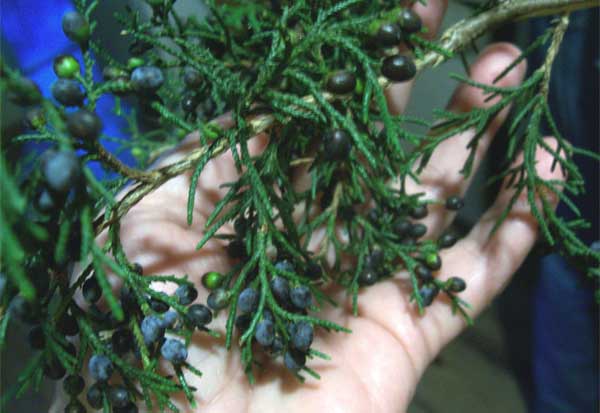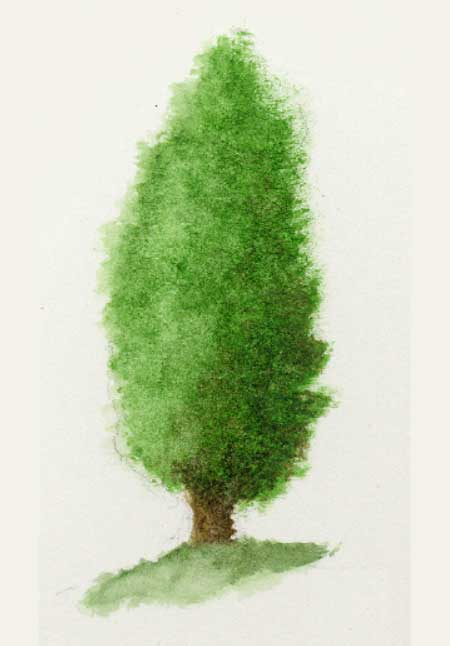Juniper in herbal medicine and aromatherapy
Juniper (Juniperus Communis) is very useful in herbal medicine and in aromatherapy. It is good for the lungs, the urinary system, and more.

Juniper leaves, berries, bark, and roots are useful in herbal medicine. The berries are really cones that take three years to become ripe.
Juniper essential oil is good for clearing out acid waste from the body especially when used in massage therapy and herbal baths. It is recommended for people with lots of cellulite.
Use juniper daily for up to four weeks then give it a rest for a month or two. Juniper has been associated with cleansing rituals and purification ceremonies since ancient times.

Juniper essential oil is used for treating water retention, depression, and more.
Juniper can help relieve upset stomach and colic. It is good for treating enlarged prostate, kidney stones, urinary infections, chills, water retention, obesity, painful periods, warts, skin growths, blocked pores, herpes, depression, gout, arthritis, muscle pain, dandruff, lice, and worms.
Juniper helps detox the liver, intestines, and bladder. It regulates the appetite, energizes the body, stops drowsiness, stimulates circulation, clears mucus from the digestive tract, and helps shrink hemorrhoids.
Juniper essential oil has a peppery, fresh aroma.
Juniper essential oil is extracted from juniper berries and leaves by steam distillation. The scent is peppery, clear, fruity, and fresh.
Juniper essential oil is good for the skin.
Juniper essential oil is a mild disinfectant useful for chronic skin conditions like eczema and psoriasis.
Juniper is also good for treating acne.
Combine one drop of juniper oil with a half cup of witch hazel and a half cup of rosewater. Apply to skin with cotton balls using a gentle circular motion. Do not scrub.
Use juniper essential oil to stop muscle and joint pain.
Add juniper essential oil to massage rubs and ointments. It helps relieve joint and muscle pain.
For joint pain, mix juniper with safflower (as carrier), lavender, and rosemary essential oils. Rub into affected area as needed for pain.
Add juniper essential oil to chest rubs.
Juniper essential oil is also added to chest rubs. Mix with thyme essential oil and a good carrier (such as almond oil) for treating lung problems like coughs, colds, and flu symptoms.
In aromatherapy, juniper essential oil brings about peaceful, loving feelings.
Juniper oil can help calm the nerves by bringing about feelings of love, peace, health, and tranquility.
The aroma relieves stress, anxiety, and mental exhaustion.
Juniper may be used in vaporizers, lotions, creams, ointments, massage oils, and compresses.
For best results, blend with cedarwood, geranium, grapefruit, lavender, bergamot, lime, clary sage, or lemon grass essential oils.
Read more about making your own herbal products at home.
Juniper essential oil is added to soaps and perfumes.
Juniper essential oils are added to soaps, perfumes, air fresheners, and incense. Juniper essential oil is even used as a household disinfectant. Dilute with water and use on most hard surfaces.
Juniper berries are used to flavor gin. Do NOT take juniper essential oil internally. Also, do not eat but a few of the berries at one time.
Juniper essential oil helps get rid of fleas and ticks.
Juniper essential oil is a good flea and tick preventive for pets. Mix a few drops of juniper and eucalyptus essential oils with water in a spray bottle. Apply to pet (avoid the face and eyes) and bedding on a daily basis.
If your pet has dry scaly skin, add 4 drops of juniper essential oil to the bath water. This will help heal and protect the pet’s coat and skin.
Do not apply any essential oil to the pet's fur, skin, or collar, even if diluted, unless the animal has access to fresh air. Some pets cannot tolerate essential oils! The first time you use any remedy on your pet, keep a close eye out for allergic reactions.
Read more about herbal remedies for pets.

Confusion between junipers and cedars
Junipers or cedars? When immigrants came to the Americas from the old world, they were familiar with cedars, including the Cedars of Lebanon. They called North American juniper trees "cedars" (the wood of both trees is red).
The Eastern Redcedar and the Southern Redcedar are really Juniper Virginiana! Western Redcedar is actually Juniperus Occidentalis. It can get confusing.
Of the roughly 40 species of juniper, a small number are poisonous. The poisonous juniper berries taste bad. The safe ones have a pleasant taste. Just eat a few at first, and see how your body reacts.
Most juniper berries, like the Eastern Redcedar, can be used in herbal medicine but they are not as aromamatic as the common juniper. Larger, fleshy common juniper (Juniperus Communis) berries are preferred for flavoring and essential oil.
When purchasing the oil or plant for medicinal purposes, look for Juniper Communis since it is safe and has the most potent berries.
Juniper berries, leaves, and roots are also useful in herbal medicine.
Juniper berries and leaves are very useful when taken in small amounts and can treat many common health problems. If using whole juniper berries, start with 3 or 4 the first day, 6 or 7 the second day, 10 or 12 the third day up to 20 a day.
Do not use juniper for long periods! Take for up to a month and stop for at least another month.
Juniper berries and leaves can be toxic in large doses! If you experience diarrhea, stop taking juniper berries and juniper leaf tea internally.
There are many species of juniper. The one that grows here on Payne Mountain Farms is known as Southern Redcedar.
Science, juniper, and herbal medicine
Juniper is rich in aromatic oils, sugars, resins, terpenes, alkaloids, flavonoids, tannins, and gums.
Juniper berry extract is shown to be useful in the treatment of edema, arthritis, diabetes, stomach disorders, and autoimmune diseases.
The essential oil and extract are documented to have strong antioxidant, antibacterial, antiviral, and antifungal properties.
The genus Juniperus has over 75 species that range from the Arctic to the tropics!
Dried berries are black or dark blue and are used to in medicine and to flavor food.
The antioxidants in juniper berry extract are very potent. They work to clear heavy metals and harmful free radicals from the body.
More about juniper in herbal medicine
Juniper extracts are also shown to protect nervous tissue and memory. They may prove to be a good treatment for Parkinson disease, diabetes, and liver disease, but more testing is needed.
Juniper berries are chewed to treat inflamed gums. Juniper's antiseptic and anti-inflammatory properties can help heal the gums, mouth sores, and ulcers.
Juniper plant is known to support the urinary system, although excessive use may cause irritation.
Juniper also has anti-fertility effects due to its antiprogestagenic activity. Do not use juniper when trying to get pregnant, or if you are pregnant!
Juniper is safe for most adults when taken short term and in low doses.
Juniper should not be taken by diabetics because it can interfere with medication. It can lower blood sugars to very low levels.
Some people are allergic to juniper essential oil when used on the skin. Discontinue use if you experience rash or other allergy symptoms.
American indians considered juniper the Tree of Life.
American indians used the juniper's leaves, bark, berries, and roots.
The leaves were made into bedding. The berries, leaves, and roots were used to treat health problems. The bark was used for making canoes and mats.
For more information about how the Native American tribes used juniper, visit https://plants.usda.gov/plantguide/pdf/cs_juvi.pdf.
*Do not use juniper essential oil if you are pregnant, are on medication for diabetes, or have kidney disease. Do not take juniper essential oil internally. Do not take juniper berries, roots, or leaves internally for more than 4 weeks then give it a rest for at least a month.
Keep all essential oils away from the eyes. Do not take essential oils internally without consulting a qualified health professional. Always dilute essential oils with good carrier oil and test on small area of skin before use. Always consult with a healthcare professional before using any herbal remedy especially if pregnant, nursing, or taking other medicines.
Sources:
https://www.ncbi.nlm.nih.gov/pmc/articles/PMC6726717/
Blessings to you and yours!
Thanks so much for reading my blog. Jan.

*Note - the information on this website has not been evaluated by the Food and Drug Administration.
© 2005-2024 website design and content by Janice Boling